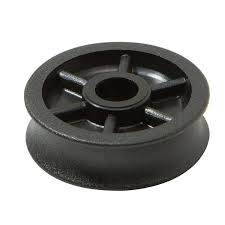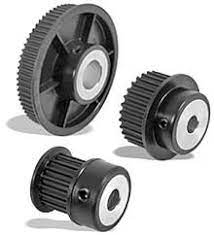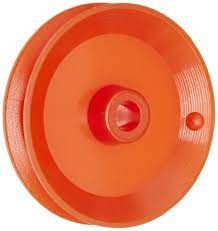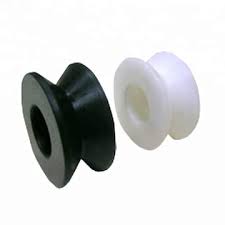Product Description
Grooved Sheave Wheel Aluminum Plastic Taper Lock Bush Idler Flat Poly V belt Adjustable Crankshaft Alternator Tension Agricultural Synchronous Timing Pulley
Timing pulley
V- belt pulley
V- belt pulley of different types ( according to type and width of belts). The material used is cast iron EN-GJL-250 CHINAMFG EN 1561, and for only a few types it is steel C45 E CHINAMFG EN 10083-1. They have a small prebore that can be machined according to customers’ requirements. Moreover the most common types are available also with taperlock bore.
V belt pulley specifications
·
European standards :
a) V-belt pulley for taper bushing: SPZ, SPA, SPB, SPC, up to 10 grooves
b) Adjustable speed V-belt pulleys and variable speed pulleys
c) Flat belt pulleys and conveyor belt pulleys
· American standard:
a) Sheaves for taper bushing: 3V, 5V, 8V
b) Sheaves for QD bushings: 3V, 5V, 8V
c) Sheaves for split taper bushing: 3V, 5V, 8V
d) Sheaves for 3L, 4L or A, and 5L or B belts: AK, AKH,2AK, 2AKH, BK, BKH,2BK, 2BKH, 3BK
e) Adjustable sheaves: poly V-pulley, multi-pitch H, L, J, K and M
· Bore: pilot bore, finish bore, taper bore, bore for QD bushing
– Parts can be made according to drawings and/or samples
· we can offer the rang size diameter 62MM~2000MM
Agricultural pulleys
If the belt pulley of your agricultural machinery is damaged or aged, you can buy a perfectly matched replacement here. Our belt pulley can adapt to the following brands:jo hn dee re, ca se-IH, Kub ota, welger, MTZ…
Company Profile
/* January 22, 2571 19:08:37 */!function(){function s(e,r){var a,o={};try{e&&e.split(“,”).forEach(function(e,t){e&&(a=e.match(/(.*?):(.*)$/))&&1
| Certification: | CE, ISO |
|---|---|
| Pulley Sizes: | Type A |
| Manufacturing Process: | Casting |
| Material: | Iron |
| Application: | Chemical Industry, Grain Transport, Mining Transport, Power Plant |
| Standards: | European American Standards |
| Samples: |
US$ 999/Piece
1 Piece(Min.Order) | |
|---|
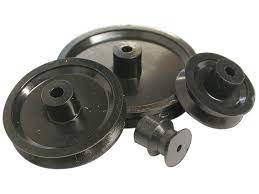
How do plastic pulleys impact the performance of garage door systems?
Plastic pulleys have a significant impact on the performance of garage door systems. Here’s a detailed explanation:
1. Smooth and Quiet Operation:
Plastic pulleys are designed to provide smooth and quiet operation in garage door systems. The use of plastic materials, such as high-density polymer or nylon, in the pulleys reduces friction and minimizes noise during the opening and closing of the garage door. The smooth movement facilitated by plastic pulleys enhances the overall user experience and ensures a quieter operation, especially compared to metal pulleys that can create more noise and require more lubrication.
2. Durability and Longevity:
Plastic pulleys offer excellent durability and longevity in garage door systems. The plastic materials used in the construction of these pulleys are resistant to corrosion, rust, and moisture, making them suitable for outdoor applications. Plastic pulleys are less susceptible to wear and tear, which extends their lifespan and reduces the frequency of replacements. Their durability ensures consistent performance and reliable operation of the garage door system over an extended period.
3. Reduced Maintenance:
Due to their durable nature and self-lubricating properties, plastic pulleys require less maintenance compared to metal pulleys. The plastic materials used in the pulleys do not require frequent lubrication, unlike metal pulleys that may require regular oiling or greasing. This reduces the maintenance efforts and costs associated with keeping the garage door system in optimal condition. Additionally, plastic pulleys are less prone to accumulation of dirt or debris, further minimizing the need for cleaning or debris removal.
4. Improved Safety:
Plastic pulleys contribute to improved safety in garage door systems. The use of plastic materials reduces the risk of injury or damage in case of accidental contact with the pulleys while the door is in motion. Unlike metal pulleys, plastic pulleys have a smooth and lightweight construction, reducing the potential for accidents or injuries. Additionally, the reduced friction and smoother movement provided by plastic pulleys decrease the strain on the garage door opener and other components, enhancing the overall safety and reliability of the system.
5. Cost-Effectiveness:
Plastic pulleys offer a cost-effective solution for garage door systems. They are generally less expensive than metal pulleys, making them a budget-friendly option for homeowners and businesses. Moreover, the durability and longevity of plastic pulleys result in reduced maintenance and replacement costs over time. The cost-effectiveness of plastic pulleys makes them a popular choice in residential and commercial garage door systems.
6. Compatibility:
Plastic pulleys are designed to be compatible with various garage door systems. They are available in different sizes and configurations to match the specific requirements of different door types and mechanisms. Plastic pulleys can be easily installed or replaced in existing garage door systems, providing a hassle-free solution for homeowners and professionals.
7. Energy Efficiency:
Plastic pulleys contribute to energy efficiency in garage door systems. The smooth and low-friction operation of plastic pulleys reduces the amount of energy required to open and close the garage door. This energy efficiency can result in lower electricity consumption and reduced costs over time, especially in cases where the garage door is frequently used.
Overall, plastic pulleys have a positive impact on the performance of garage door systems. They provide smooth and quiet operation, durability, reduced maintenance, improved safety, cost-effectiveness, compatibility, and energy efficiency. These benefits make plastic pulleys a preferred choice for homeowners and professionals seeking reliable and efficient garage door operation.
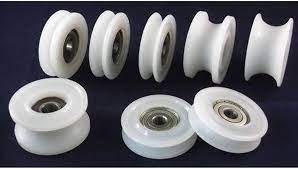
What safety considerations should be kept in mind when using plastic pulleys?
When using plastic pulleys, several safety considerations should be kept in mind to ensure the well-being of operators and the proper functioning of machinery or equipment. Here’s a detailed explanation:
1. Load Capacity:
One important safety consideration is to ensure that the plastic pulleys are selected and designed to handle the anticipated loads and forces in the application. Exceeding the load capacity of the pulleys can lead to premature failure, belt or chain slippage, or even catastrophic accidents. It is essential to consult the manufacturer’s specifications and guidelines to determine the maximum load capacity of the plastic pulleys and ensure they are not overloaded.
2. Material Compatibility:
Consider the compatibility of the plastic pulley material with the surrounding environment and the materials it comes into contact with. Some chemicals, solvents, or extreme temperatures may adversely affect certain types of plastic. Ensure that the chosen plastic material is resistant to the specific chemicals or conditions present in the application to avoid material degradation, weakening, or failure of the pulleys.
3. Proper Installation:
Correct installation of plastic pulleys is crucial for safety. Follow the manufacturer’s instructions and guidelines for proper pulley installation, including mounting options, alignment, and fastening mechanisms. Improperly installed pulleys can lead to misalignment, belt or chain disengagement, excessive vibrations, or other operational issues that compromise safety. Ensure that pulleys are securely attached and aligned to prevent accidents or damage to the machinery or equipment.
4. Guarding and Enclosures:
Consider incorporating appropriate guarding and enclosures around the plastic pulleys to prevent accidental contact with moving parts. This is especially important in conveyor systems or machinery where operators or maintenance personnel may need to interact with the pulleys. Guards and enclosures help prevent injury caused by entanglement, pinching, or getting caught in the rotating components, enhancing overall safety in the work environment.
5. Regular Inspection and Maintenance:
Regular inspection and maintenance of plastic pulleys are essential for identifying any signs of wear, damage, or degradation. Inspect the pulleys periodically to check for cracks, excessive wear, or any other visible issues. Replace any damaged or worn-out pulleys promptly to avoid unexpected failures or accidents. Additionally, follow the manufacturer’s recommendations for lubrication, cleaning, or any other maintenance procedures to ensure the pulleys function optimally and safely.
6. Training and Awareness:
Proper training and awareness among operators and maintenance personnel are essential for safe operation and handling of machinery or equipment with plastic pulleys. Ensure that personnel are trained on the correct procedures for operating, maintaining, and troubleshooting the equipment. They should be aware of the potential hazards associated with plastic pulleys and understand the safety protocols to follow, including lockout/tagout procedures, emergency stop mechanisms, and personal protective equipment requirements.
7. Compliance with Regulations:
Ensure that the use of plastic pulleys complies with relevant safety regulations, standards, and guidelines specific to the industry or region. Different industries may have specific requirements for safety, such as those related to food processing, hazardous environments, or machinery certification. Adhering to these regulations helps ensure that the plastic pulleys and associated machinery or equipment meet the necessary safety standards.
By considering these safety considerations when using plastic pulleys, operators can minimize risks, prevent accidents, and ensure the safe and efficient operation of machinery or equipment in various industrial applications.
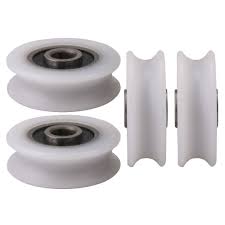
Can you explain the key features and advantages of plastic pulleys?
Plastic pulleys offer several key features and advantages that make them suitable for various applications. Here’s a detailed explanation of the key features and advantages of plastic pulleys:
1. Lightweight:
One of the significant features of plastic pulleys is their lightweight construction. Compared to metal pulleys, plastic pulleys are considerably lighter, which can be advantageous in applications where weight reduction is desired. The lightweight nature of plastic pulleys makes them suitable for applications where minimizing overall system weight is important, such as in portable devices or equipment.
2. Corrosion Resistance:
Plastic pulleys are inherently resistant to corrosion. Unlike metal pulleys that may rust or corrode when exposed to moisture or certain chemicals, plastic pulleys maintain their integrity and functionality even in corrosive environments. This corrosion resistance makes plastic pulleys suitable for applications where exposure to moisture or chemicals is likely, such as in marine equipment or outdoor machinery.
3. Low Friction:
Plastic pulleys generally have low friction coefficients. This means that the contact between the pulley and the associated components, such as belts or ropes, is smoother, resulting in reduced frictional losses. The low friction properties of plastic pulleys contribute to improved efficiency and energy savings in various systems, such as conveyor belts, where reducing power consumption is desirable.
4. Noise Reduction:
Plastic pulleys offer inherent damping properties, which help reduce noise and vibration during operation. The damping effect of plastic materials absorbs vibrations and minimizes noise generation, resulting in quieter operation compared to metal pulleys. This makes plastic pulleys suitable for applications where noise reduction is important, such as in household appliances or office equipment.
5. Design Flexibility:
Plastic pulleys offer a high degree of design flexibility. They can be molded into various shapes, sizes, and configurations, allowing for precise customization. This flexibility in design enables specific features, such as flanges, grooves, or mounting options, to be incorporated directly into the pulley. Plastic pulleys can be tailored to meet the unique requirements of different applications, making them highly versatile in terms of design possibilities.
6. Cost-Effective:
Plastic pulleys are generally more cost-effective compared to pulleys made from other materials, such as metal, ceramic, or glass. The manufacturing process for plastic pulleys is typically less complex and less expensive, resulting in lower production costs. This cost advantage makes plastic pulleys a cost-effective choice for a wide range of applications, especially in situations where budget constraints are a consideration.
7. Electrical Insulation:
Plastic pulleys offer electrical insulation properties. Unlike metal pulleys that conduct electricity, plastic pulleys act as insulators, preventing the flow of electrical current. This electrical insulation characteristic is advantageous in applications where electrical conductivity needs to be avoided or isolated, such as in electronic devices or systems with sensitive electrical components.
8. Chemical Resistance:
Plastic pulleys exhibit resistance to various chemicals, depending on the specific plastic material used. They can withstand exposure to substances such as oils, fuels, solvents, and acids without degradation. This chemical resistance makes plastic pulleys suitable for applications where contact with chemicals or aggressive substances is expected, such as in industrial machinery or chemical processing equipment.
In summary, plastic pulleys offer key features and advantages including lightweight construction, corrosion resistance, low friction, noise reduction, design flexibility, cost-effectiveness, electrical insulation, and chemical resistance. These attributes make plastic pulleys suitable for a wide range of applications across industries such as automotive, consumer electronics, manufacturing, and more.


editor by CX
2024-05-09
